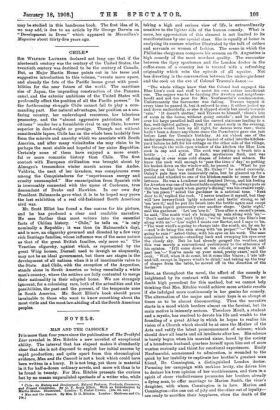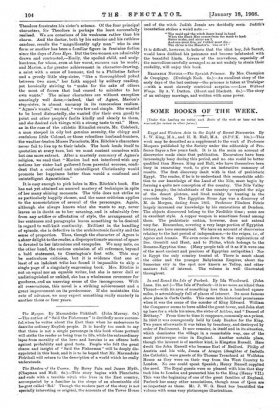NOVELS.
MAN AND THE CASSOCE.t
• IT is more than four years since the publication of The Truthful Liar revealed in Mrs. Ritchie a new novelist of exceptional ability. The interval that has elapsed makes it abundantly clear that she is not disposed to exploit her initial success by rapid production; and quite apart from this chronological evidence, Man and the Cassock is not a book which could have been written in a hurry. It is not long, yet there is material in it for half-a-dozen ordinary novels, and more wit than is to be found in twenty. For Mrs. Ritchie presents the curious but by no means unparalleled spectacle of a writer who, while • Chile: its History and Dec/Wpm/int, Natural Features. Products, Commerce. and Present Conditions. By G. F. Scott Elliot. With an Introduction by Martin Hume. Illustrated. London: T. Fisher tinwin. [10s. 6d. net.1 t Man and the Cassock. By Mrs. D. G. Ritchie. London : Methuen and Co.
[64.]
taking a high and serious view of life, is extraordinarily sensitive to the lighter side of the human comedy. What is more, her appreciation of this element is not limited to its manifestations by one special class. She is equally at home in analysing its essence whether illustrated by the talk of ostlers and servants or women of fashion. The scene in which the Philistine clergyman composes his sermon on St. Augustine is high comedy of the most mordant quality. The encounter between the tipsy sportsman and the London doctor in the coffee-room of a country inn is treated with a refreshing originality which robs the episode of all squalor. Not less diverting is the conversation between the under-gardener and the cook on the eve of Colonel Travers's dance :— "The whole village knew that the Colonel had engaged the Blue Lion's cook and staff to assist his own rather insufficient one. The supper was to be dazzling (for Averton and neighbour- hood) and and not too poor for Mrs. Neufmarche's condescension. Unfortunately the barometer was falling. Travers tapped it every time he passed it, but it refused to rise; it either jerked up and down undecidedly, or else it slipped slowly but surely towards `rain." It doesn't matter,' said Travers to himself, 'there's lots of room in the house, without going outside ' ; and he glanced over his large panelled hall and the carved staircase leading to .a fine, well-lighted gallery. Even if it rained early in the evening, his guests would turn up all right, for dances were rare ; there hadn't been a dance anywhere since the Parachutes gave one juit before Lent for Ursula's birthday. At six o'clock one of the under-gardeners, carrying a large basket of salad into the kitchen- yard before he left for his cottage on the other side of the village, saw through the wide open window of the kitchen the Blue Lion cook in cap and apron. The cook was putting a brush into a bottle full of a dark, mysterious fluid, and Was brushing it over some cold shapes of lobster and salmon. He knew the cook well enough to • pass the time o' day,' no putting his basket down on the window-sill, he peered in. What be yer putting on that 'ere stuff for Mr. Oxley F' he asked curiously. Oxley's pale face was immovably calm, but he glanced up for a second and whistled to one of the kitchen-maids to come for the lettuces. He was a Londoner and despised Devon, and his feeling for Averton was one of indescribable contempt. We always puts on this 'ere beastly muck when gentry's dining,' was his evasive reply. • Be 'em pison ? ' asked the gardener in a satirical tone. hext door to it,' replied the cook. never touches it myself, but they will 'ave heverythink 'ighly coloured and. tastin' strong, so let 'em 'ave it,' and he put his brush into the bottle again and swept the green liquid generously over another shape. Quite right,' said the gardener. Let 'em 'ave it.' Then after a second's pause, he said, The south wind e's bringing up rain along with 'an:— Don't matter to me,' said Oxley ; we've brought the Blue's bus along with us.'—' Las' night I meets our Rector, and I says to 'im, "The west wind's a-going to change into the south, sir, by em by —and 'e do bring the rain along with 'un proper." '—' When 'a it going to rain ?' asked Oxley, with his eyes on his work. The man considered a minute—standing back and sweeping his eyes Over the cloudy sky. But he had already gauged the weather, and this was merely a conventional preliminary to the utterance of his opinion. It'll come down at ten o'clock, or maybe at 'alf- past ten.'—' You've made up your mind, pretty exact,' said the cook. • Well, when it do come, let it come like blazes ; I 'ate 'elf- and-'alf, except in liquors what's to drink,' and taking up the tray of shapes from the table, he moved off in the direction of the larder.'
Here, as throughout the novel, the effect of the comedy is heightened by its contrast with the context. There is no doubt high precedent for this method, but we cannot help thinking that Mrs. Ritchie would achieve more artistic results if she indulged more continuously in her genius for comedy. The alternation of the major and minor keys is so abrupt at times as to be almost disconcerting. Thus the narratiVe starts in a mood which borders almost on the farcical, but its main motive is intensely serious. Theodore Moult, a student and a mystic, has resolved to devote his life and wealth to the founding of a great Abbey in which he hopes to realise his vision of a Church which should be at once the Mother of the Arts and ratify the latest pronouncement of science ; which should draw all hearts and all intellects after her. His scheme is barely begun when his married sister, bored by the society of a humdrum husband, quarters herself upon him out of mere wanton curiosity and thirst for emotional experiences. Emily Neufmarche, accustomed to. admiration, is wounded to the quick by her inability to captivate her brother's greatest man friend, Dr. Connington, a distinguished London doctor. Pursuing her campaign with reckless levity, she drives him to declare his true opinion of her worthlessness, and then in a spirit of sheer vindictiveness persuades her brother, already a dying man, to offer marriage to Marion Smith, the vicar's daughter, with whom Connington is in love. Marion and Connington—the one out of pity and the other out of loyalty— are ready to sacrifice their happiness, when the death of Sir
Theodore frustrates his sister's scheme. Of the four principal characters, Sir Theodore is perhaps the least successfully realised. We are conscious of his weakness rather than his
• --charm. And.the doctor, both by his exterior and his ruthless candour, recalls the "magnificently ugly man" who in one form or another has been a familiar figure in feminine fiction since the days of Jane Eyre. But the two women are admirably . drawn and contrasted,—Emily, the spoiled child, and scalp- huntress, for whom, even at her worst, excuses can be made; and Marion, a far greater achievement in character-drawing, a saint with a sense of humour, tied to a Philistine father and a greedy little step-sister, "like a thoroughbred yoked between two oxen," her faith sapped by solitary reading, yet heroically striving to "make for the sake of others ' the most of forces that had ceased to minister to her own wants." The minor characters are without exception amazingly well tone,—indeed, that of Agnes, Marion's step-sister, is almost uncanny in its remorseless realism. "Ag,nes's wants," we reed, "were few and simple. She wanted to be loved distractedly, she wanted (for their own good) to point out other people's faults kindly. and clearly to them, and she desired rich things with a strong taste to eat." Here, as in the case of the athletic Ritualist curate, Mr. Colebeck, a man steeped in oily but genuine serenity, the chirpy and . credulous little Colonel, or those relentless husband-hunters,
• the weather-beaten Misses Parachute, Mrs. Ritchie's characters • never fail to live up to their labels. The book lends itself to quotation at every turn, but we must content ourselves with but one more extract. After a masterly summary of Agnes's • religion, we read that "Marion bad not interfered with any *notions her sister had gathered from parental sources, confi- dent that a confused and unintelligent Christianity would promote her happiness better than would a confused and unintelligent Agnosticism."
• It is easy enough to pick boles in Mrs. Ritehie's book. She bas not yet attained an assured mastery of technique in spite . of her many shining moments. The title does not strike us as particularly happily chosen, and the same criticism applies to the nomenclature of several of the personages. Again, although she always knows what she wants to say, never leaves us in donbt as to her meaning, and is admirably free from any artifice or affectation of style, the arrangement of her sentences and paragraphs leaves something to he desired in regard to well-knit continuity. Brilliant in the handling of episode, she is defective in the architectonic faculty and the sense of proportion. Thus, though the character of Agnes is a sheer delight to the reader, a disproportionate amount of space is devoted to her intrusions and escapades. We may note, on the other band, the curious omission of all reference, beyond a bald statement, to .Connington's first wife. This may ' be meticulous criticism, but it is evidence that one at least of an indolent tribe has found it impossible to skip a single page a a singularly engrossing book. Mrs. Ritchie is not an equal nor an equable writer, but she is never dull or undistinguished or unkind, she has a wholesome reverence for goodness, and an unerring sense of the incongruous. With all reservations, this novel is a striking achievement and a great improvement on its predecessor. If she maintains this rate of advance, we may expect something really masterly in another three or four years.







































 Previous page
Previous page